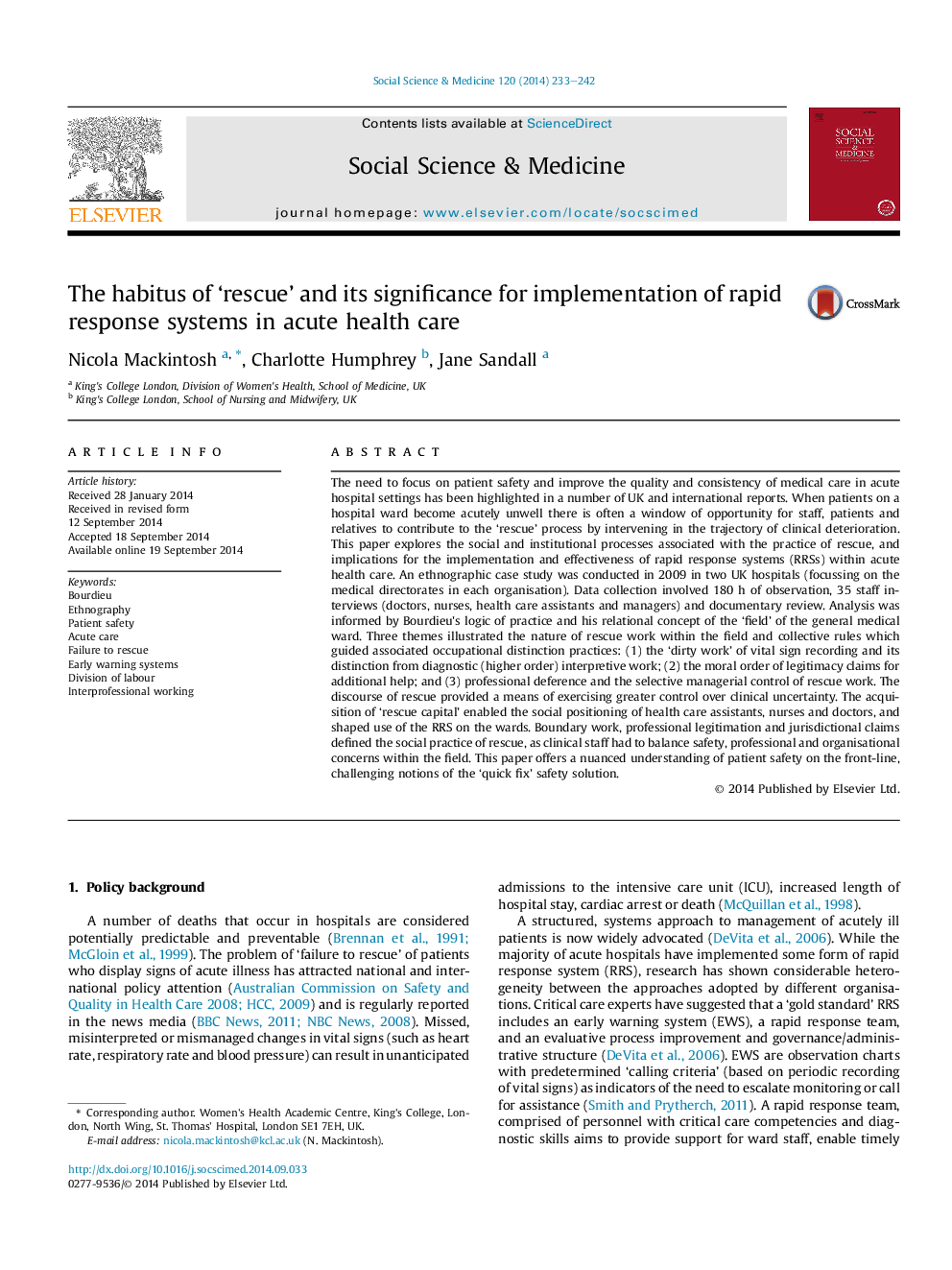| کد مقاله | کد نشریه | سال انتشار | مقاله انگلیسی | نسخه تمام متن |
|---|---|---|---|---|
| 7334676 | 1476048 | 2014 | 10 صفحه PDF | دانلود رایگان |
عنوان انگلیسی مقاله ISI
The habitus of 'rescue' and its significance for implementation of rapid response systems in acute health care
ترجمه فارسی عنوان
عادت "نجات" و اهمیت آن برای پیاده سازی سیستم های پاسخ سریع در مراقبت های بهداشتی حاد
دانلود مقاله + سفارش ترجمه
دانلود مقاله ISI انگلیسی
رایگان برای ایرانیان
کلمات کلیدی
بوردیو، اتنوگرافی، ایمنی بیمار، حاد مراقبت، شکست نجات، سیستم های هشدار دهنده اولیه تقسیم کار، کار بینفرهنگی
موضوعات مرتبط
علوم پزشکی و سلامت
پزشکی و دندانپزشکی
سیاست های بهداشت و سلامت عمومی
چکیده انگلیسی
The need to focus on patient safety and improve the quality and consistency of medical care in acute hospital settings has been highlighted in a number of UK and international reports. When patients on a hospital ward become acutely unwell there is often a window of opportunity for staff, patients and relatives to contribute to the 'rescue' process by intervening in the trajectory of clinical deterioration. This paper explores the social and institutional processes associated with the practice of rescue, and implications for the implementation and effectiveness of rapid response systems (RRSs) within acute health care. An ethnographic case study was conducted in 2009 in two UK hospitals (focussing on the medical directorates in each organisation). Data collection involved 180Â h of observation, 35 staff interviews (doctors, nurses, health care assistants and managers) and documentary review. Analysis was informed by Bourdieu's logic of practice and his relational concept of the 'field' of the general medical ward. Three themes illustrated the nature of rescue work within the field and collective rules which guided associated occupational distinction practices: (1) the 'dirty work' of vital sign recording and its distinction from diagnostic (higher order) interpretive work; (2) the moral order of legitimacy claims for additional help; and (3) professional deference and the selective managerial control of rescue work. The discourse of rescue provided a means of exercising greater control over clinical uncertainty. The acquisition of 'rescue capital' enabled the social positioning of health care assistants, nurses and doctors, and shaped use of the RRS on the wards. Boundary work, professional legitimation and jurisdictional claims defined the social practice of rescue, as clinical staff had to balance safety, professional and organisational concerns within the field. This paper offers a nuanced understanding of patient safety on the front-line, challenging notions of the 'quick fix' safety solution.
ناشر
Database: Elsevier - ScienceDirect (ساینس دایرکت)
Journal: Social Science & Medicine - Volume 120, November 2014, Pages 233-242
Journal: Social Science & Medicine - Volume 120, November 2014, Pages 233-242
نویسندگان
Nicola Mackintosh, Charlotte Humphrey, Jane Sandall,
